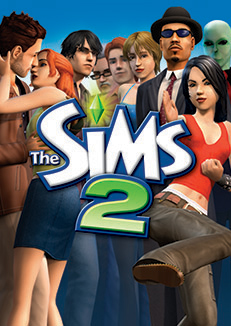Let it go: social anxiety and life sims
A short essay exploring my changing relationship with social interaction through the lens of The Sims and Tomodachi Life.

My palms are trembling, my heart pounding in my chest as I inch the mouse towards the button to start the instance. Is this the day that I succeed? Will I finally beat this thing at last? My cursor wavers over the button- but I lose my nerve and turn back once again to the much safer “Friendly Hug”. I slump a little in my chair, equal parts relieved and disappointed in myself.
I played a lot of video games growing up. Besides working my way through the obligatory educational math and reading programs that my mom installed, I ended up following my older brother into pretty much every game that he got, from Starcraft to Counterstrike to Maplestory to Super Smash Brothers. However, the first game I really got into on my own was The Sims 2. When I wasn’t at the computer, I would be reading guides, memorizing the handbook or just planning out my next house and family. I had a little notebook where I wrote out the personalities of my sims, their projected career paths, and how they would fit into the neighborhood.
 A few of my friends at school also played the game, so I spent many a free period happily chatting about the shenanigans our virtual people got up to. However, I would slowly come to realize that there was a fundamental difference between the ways my friends and I approached the game. I’ll never forget the bafflement I felt as my friend Aurora complained about the difficulty she had carrying a baby sim to term. Apparently, for her, the mother would invariably die at some point during her three day pregnancy due to the simulated hormonal mood swings. “They just have so many needs!” she would gripe, “You leave them for a second and they’ve burned the house down because they left the food in the oven because they’ve suddenly fallen asleep!”
A few of my friends at school also played the game, so I spent many a free period happily chatting about the shenanigans our virtual people got up to. However, I would slowly come to realize that there was a fundamental difference between the ways my friends and I approached the game. I’ll never forget the bafflement I felt as my friend Aurora complained about the difficulty she had carrying a baby sim to term. Apparently, for her, the mother would invariably die at some point during her three day pregnancy due to the simulated hormonal mood swings. “They just have so many needs!” she would gripe, “You leave them for a second and they’ve burned the house down because they left the food in the oven because they’ve suddenly fallen asleep!”
“But,” I would think, “why are you leaving them even for a second? How could you leave her alone long enough to leave the oven unattended, let alone long enough to let them fall asleep?!?” Even as a middle schooler, I micromanaged the shit out of my virtual families. I had played the original Sims game, but newer installment introduced a whole host of new ways to control the lives of my minions. My sims would wake up at the crack of dawn, shower, cook breakfast, eat, run off to work, come back home, develop relevant skills, then sleep long enough to be refreshed to start it over again the next day. The whole family would be engaged in a constant, complex dance to ensure efficient skill development, relationship maintenance, and home improvement. I proudly presided over my families as each member grew more skilled, more rich, and more popular, each a paragon of their chosen career paths. Accidental death was absolutely out of the question for any of them.
However, one of the new features of The Sims 2 never quite fit into my playthroughs. Sims could throw parties to celebrate occasions like birthdays and weddings, or just for the sake of having people over. Your sim would invite a number of guests to the house, or a public outing space, and then play host for a set amount of time. At the end, you would earn a score based on the amount of fun the guests had.
I absolutely dreaded any time my sims wanted to go on a date, throw a party, or host a guest. I would plan ahead meticulously, trying to choreograph the entire family around mission success, but there were a dizzying number of variables to account for. For example, if you had twenty people over and only four sims in the family, it was literally be impossible to make sure that every guest was occupied. On top of providing entertainment, one would have to work make sure the amenities were covered, supply food, as well as maintain the guests’ relationships with one another. Dates were a little better, since there were only two people’s happiness I was responsible for, but there was an incident where one of my sims almost died from starvation because I couldn’t bring myself to let him stop and eat in the middle of impressing his date, since it would have ruined the flow of conversation.
At this point, you’re probably reading this, eyebrows raised, thinking, “Girl, you have some serious problems.” Worry not! I know I definitely had/have problems. I was diagnosed with General Anxiety Disorder in college, flavored with an added splash of perfectionist tendencies and an [un]healthy dollop of depression from failing to meet those impossible standards. The way I played The Sims was a microcosm of how I believed I should live my life.
Spontaneity was absolutely disallowed. Why the hell is John running off to play pinball right now when he could be studying mechanics for his job? His fun stat is fine; he doesn’t need to take a break for another two hours at the very least. No, don’t go greet the random neighbor who rang the doorbell to say hi! They’ll distract Mara from practicing piano - then probably loiter around and we’ll have to feed them for dinner. Oh fine, Jade can step outside and build a relationship with that person, since she needs to find another friend to progress in her job anyways, but for god’s sake, don’t invite them into the house.
In this vein, social interaction was controlled entirely and done many times out of efficiency. When I discovered that sims who were friendly with each other were able to sleep next to each other, I spent a full day just having my family give compliments, friendly hugs and back rubs to each other so I could save space and money on beds. I approached everything with a purpose in mind; there was no point in gaining a random acquaintance by waving hi to them as they walked by, because there was nothing in it for me. An additional friend was an investment, one that needed to be maintained through constant interaction, using time that could be spent doing other productive things.
 Parties scared me because of the vast possibility space stretching out due to the number of uncontrolled factors. I couldn’t directly order guests to have fun, but I needed to make them have fun anyways somehow. These chaotic elements, run on some incoherent AI, seemed to be out to smash all my perfect plans. They would do things like try to walk in on each other in the bathroom, start fights with other guests, leave trash everywhere or get stuck in a badly designed corner and pass out - and I was helpless to stop them. Worse still, these uncontrollable reactions would still have an effect on my scored performance.
Parties scared me because of the vast possibility space stretching out due to the number of uncontrolled factors. I couldn’t directly order guests to have fun, but I needed to make them have fun anyways somehow. These chaotic elements, run on some incoherent AI, seemed to be out to smash all my perfect plans. They would do things like try to walk in on each other in the bathroom, start fights with other guests, leave trash everywhere or get stuck in a badly designed corner and pass out - and I was helpless to stop them. Worse still, these uncontrollable reactions would still have an effect on my scored performance.
These worries manifested almost directly in my approach to social interaction in my daily life. Before any planned interaction, I would attempt to identify every factor that could affect the outcome. Am I too casual for this person? I heard that this boss is a bit old-fashioned, so I better dress better before approaching them. But what if I come off as too stiff while trying to be formal and make the other workers think I’m stuck up or out of touch? Do I know what kind of mood the interviewer is in right now? What if their dog died recently and they’re just in a bad mood? Should I express my condolences, or just try to not bring it up? Would that seem callous? But if I seem too sad, I might look like I’m using a personal tragedy to try to brown nose my way in…
As a result, I would invariably end up paralyzed, feeling like I needed more information to continue or just deciding to give up on doing it at all. Supposedly routine interactions would spiral out of control in my head, turning into complicated webs of information to analyze as I tried to account for every potentiality.
Besides being an incredibly stressful way to play one of the most ‘casual’ games in existence, this micromanagment heavy style completely misses a fundamental part of the simulation genre. Because everything is optimized in advance for, nothing you do is ever surprising; if it is, the plan failed and you did something wrong. It wasn’t until I picked up Tomodachi Life that I really understood the appeal of just allowing random events to drive the game forwards.
When compared to The Sims series, Tomodachi Life is an embarrassingly simple game. The mii avatars populating the island can only do an extremely limited number of actions and buildings are nigh uncustomizable. Most importantly, players cannot directly control their residents and are relegated to playing as a sort of benevolent landlord who occasionally is asked for advice. On top of this, there was no fail state to worry about; if a resident was rejected by their crush, they would just leave and be sad for a while, a mood easily fixable by feeding them some of their favorite food and giving them bubble baths. This lack of interactivity drew a lot of criticism towards the game, but this removal of control is what forced me to relax my habit for micromanagement, since that option was literally unavailable.
For the first time, I made myself just step back and watch. As I started importing miis to the island, I made an oath to myself that I would not block any mii requests, and just let events play out. I giggled as Dave Strider made a news report about getting attacked by crows who were after his shiny, shiny sunglasses. Three of my male friends formed a boy band and I spent a distressing amount of time making them sing silly songs in their pitch shifted voices. Morpheus (Dream from The Sandman, not the guy from The Matrix) and Commander Shepard fell in love and started dating, leaving Garrus in the dumps. Immediately upon moving in, Hannibal Lecter insisted on befriending Will Graham, who constantly dreamt of giant heads rising out of the sea. My roommate and I spent an entire evening penning Eren Jaeger a sappy ballad about his passion for killing titans.
As tempting as it was to set up perfect couples and engineer social circles, I realized that just allowing things to happen naturally led to far more amusing circumstances than anything I could have planned initially. Because things were not directly under my control, I was forced to constantly reevaluate the context of the situation, writing and rewriting narratives in my head describing the randomly changing relationships between each character. Rolling with the surprises and setbacks was actually a fun, interesting challenge once I accepted that failure wasn’t the end of the world.
I’m not saying that everyone needs the life changing experience of watching virtual copies of your family decide to roll around the floor for entertainment. The criticism over lack of content and replayability levied at the game is well deserved, nor does everyone enjoy the specific brand of surrealist non sequitur that the game’s humor is fueled with. However, having the game foist its chaos on my carefully built and constructed world allowed me to explore letting go of control in a safe and consequence free environment. Returning to later installments of The Sims, I experimented with allowing the AI to make its own decisions, though I still kept a close eye on my little minions to ensure their safety and wellbeing. Relaxing my iron fist on their every move vastly improved my experience of the genre, and that spilled over a little into my daily life. I’ve invited friends over, planned events and everything without it all blowing up in my face even! That said, I think I have an overdue party to host in The Sims 4.
Read more about:
BlogsAbout the Author(s)
You May Also Like













